Reduction in Pendency of Public Grievances- The Centralised Public Grievance Redress and Monitoring System (CPGRAMS) has undergone a significant reform process resulting in a reduction in pendency and the average time of disposal of public grievances, according to Union Minister of State, PMO, Personnel, Public Grievances, Pensions, Minister of State (Independent Charge) Science & Technology, M/o Earth Sciences; MoS, Atomic Energy and Space, Dr Jitendra Singh.
In a statement released on March 22, 2023, Dr. Singh revealed that the Ministries/Departments had disposed of 1.14 lac Public Grievances (PG) cases in August, 1.17 lac Public Grievances (PG) cases in September, 1.19 lac Public Grievances (PG) cases in October, 1.08 lac Public Grievances (PG) cases in November, 1.27 lac Public Grievances (PG) cases in December, 2022, and 1.25 lac Public Grievances (PG) cases in January, 2023. This marks the first time since the inception of CPGRAMS that PG case redressal has crossed one lakh cases per month.
The government has taken several initiatives to improve the quality of grievance redressal and reduce the timelines of disposal. In 2022, the government implemented the ten-step reforms of CPGRAMS, including universalization of CPGRAMS 7.0, technological enhancements using AI/ML, language translation of CPGRAMS portal into 22 Scheduled languages, operationalization of Grievance Redressal Index, operationalization of a Feedback Call Centre, One Nation One Portal by integration of State Portal/Other Grievance Portals of Government of India with CPGRAMS, inclusivity and outreach with availability of CPGRAMS in all Common Service Centres, Training and Capacity Building of Grievance Redressal Officers under Sevottam scheme, publishing monthly reports for Central Ministries/Departments and States/UT’s and establishment of a Data Strategy Unit for data analytics.
According to Dr. Singh, the average disposal time of Central Ministries/Departments has decreased from 32 days in 2021 to 27 days in 2022 and to 19 days in January 2023. The 2022 Feedback Call Centre report indicated 2,51,495 successful calls, of which 57,486 had excellent and very good feedback and 73,817 calls where citizens expressed satisfaction. In case of poor rating, the option of appeal to a higher officer is provided to the citizen. Nodal and Sub-Nodal Appellate Authorities have been operationalized in all Ministries/Departments.
The reforms have led to a significant reduction in pendency and the average time of disposal of public grievances, providing relief to the citizens. The 10-step CPGRAMS reforms process has been instrumental in achieving this, and the government plans to continue to make improvements in this area.
#CPGRAMS #PublicGrievances #GovernmentReforms #GrievanceRedressal #DataAnalytics #FeedbackCallCentre #SevottamScheme #DataStrategyUnit #Universalization #TechnologicalEnhancements #LanguageTranslation #OneNationOnePortal #InclusivityAndOutreach #NodalAppellateAuthorities #SubNodalAppellateAuthorities #CentralMinistries #Departments #India
- Quantum Breakthrough: Room-Temperature Superconductivity Achieved
- India’s Cricket Fervor Hits Fever Pitch as World Cup Final Nears
- India Takes on Australia in the 2023 ICC Men’s Cricket World Cup Final
- Pharma Jobs: AIIMS Raipur Announces Direct Recruitment for 31 Pharmacist and Dispensing Attendant Positions; Applications Open till July 31, 2023
- Got Utkarsh Small Finance Bank IPO? Find Out NOW! Simple Steps to Check Your Allotment Status!
- Voltas and Zee Entertainment Lead as Volume Toppers in Stock Market; See High Trading Activity








